大学英语四级备考——听力短文理解十大主题
- 格式:doc
- 大小:57.50 KB
- 文档页数:4
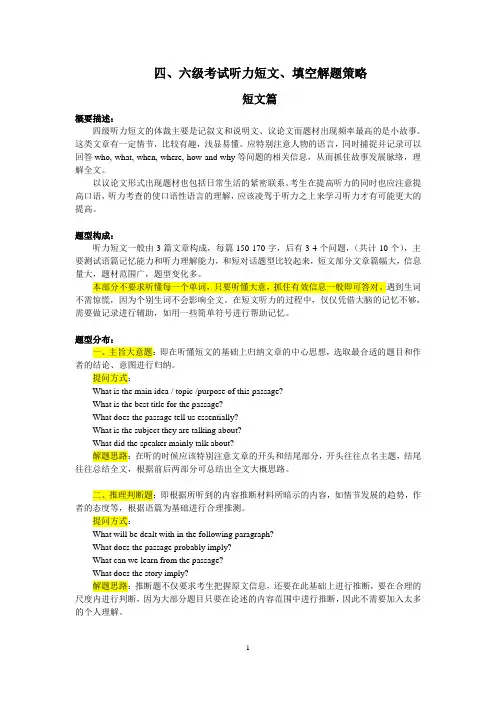
四、六级考试听力短文、填空解题策略短文篇概要描述:四级听力短文的体裁主要是记叙文和说明文、议论文而题材出现频率最高的是小故事。
这类文章有一定情节,比较有趣,浅显易懂。
应特别注意人物的语言,同时捕捉并记录可以回答who, what, when, where, how and why等问题的相关信息,从而抓住故事发展脉络,理解全文。
以议论文形式出现题材也包括日常生活的紧密联系。
考生在提高听力的同时也应注意提高口语,听力考查的使口语性语言的理解,应该凌驾于听力之上来学习听力才有可能更大的提高。
题型构成:听力短文一般由3篇文章构成,每篇150-170字,后有3-4个问题,(共计10个),主要测试语篇记忆能力和听力理解能力,和短对话题型比较起来,短文部分文章篇幅大,信息量大,题材范围广,题型变化多。
本部分不要求听懂每一个单词,只要听懂大意,抓住有效信息一般即可答对。
遇到生词不需惊慌,因为个别生词不会影响全文。
在短文听力的过程中,仅仅凭借大脑的记忆不够,需要做记录进行辅助,如用一些简单符号进行帮助记忆。
题型分布:一、主旨大意题:即在听懂短文的基础上归纳文章的中心思想,选取最合适的题目和作者的结论、意图进行归纳。
提问方式:What is the main idea / topic /purpose of this passage?What is the best title for the passage?What does the passage tell us essentially?What is the subject they are talking about?What did the speaker mainly talk about?解题思路:在听的时候应该特别注意文章的开头和结尾部分,开头往往点名主题,结尾往往总结全文,根据前后两部分可总结出全文大概思路。
二、推理判断题:即根据所听到的内容推断材料所暗示的内容,如情节发展的趋势,作者的态度等,根据语篇为基础进行合理推测。

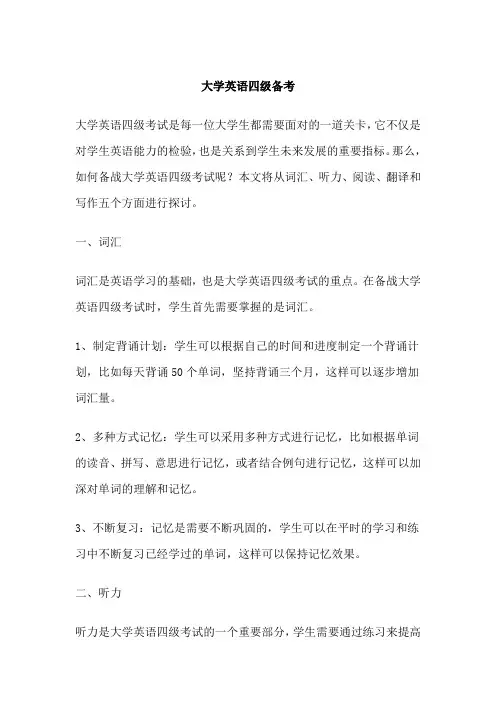
大学英语四级备考大学英语四级考试是每一位大学生都需要面对的一道关卡,它不仅是对学生英语能力的检验,也是关系到学生未来发展的重要指标。
那么,如何备战大学英语四级考试呢?本文将从词汇、听力、阅读、翻译和写作五个方面进行探讨。
一、词汇词汇是英语学习的基础,也是大学英语四级考试的重点。
在备战大学英语四级考试时,学生首先需要掌握的是词汇。
1、制定背诵计划:学生可以根据自己的时间和进度制定一个背诵计划,比如每天背诵50个单词,坚持背诵三个月,这样可以逐步增加词汇量。
2、多种方式记忆:学生可以采用多种方式进行记忆,比如根据单词的读音、拼写、意思进行记忆,或者结合例句进行记忆,这样可以加深对单词的理解和记忆。
3、不断复习:记忆是需要不断巩固的,学生可以在平时的学习和练习中不断复习已经学过的单词,这样可以保持记忆效果。
二、听力听力是大学英语四级考试的一个重要部分,学生需要通过练习来提高听力水平。
1、练习听力材料:学生可以选择一些听力材料进行练习,比如英语新闻、英语电影、英语歌曲等,这样可以提高听力的同时,也可以学习一些常用的表达方式。
2、多听多练:学生可以多听多练,比如每天听半个小时的英语新闻,或者每周看一部英语电影,这样可以逐渐提高听力水平。
3、注意听力技巧:在听力考试中,学生还需要注意一些听力技巧,比如注意关键词、注意听力问题的提问方式、结合上下文进行理解等。
三、阅读阅读是大学英语四级考试的另一个重要部分,学生需要通过练习来提高阅读能力。
1、多读英语文章:学生可以多读一些英语文章,比如英文新闻、英文小说、英文报告等,这样可以提高阅读理解的能力。
2、注意阅读技巧:在阅读考试中,学生还需要注意一些阅读技巧,比如快速阅读、注意关键词、注意段落的结构等。
3、练习阅读题目:学生可以选择一些阅读题目进行练习,比如英语阅读理解题、英语完形填空题等,这样可以提高阅读能力和解题能力。
四、翻译翻译是大学英语四级考试的一个难点,学生需要通过练习来提高翻译能力。
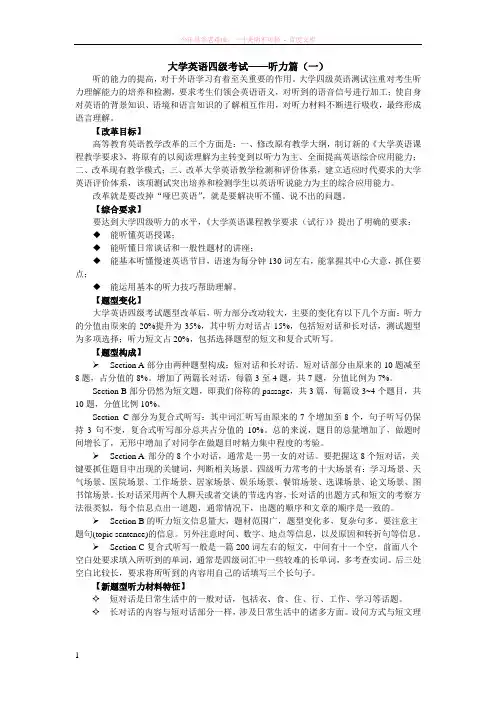
大学英语四级考试——听力篇(一)听的能力的提高,对于外语学习有着至关重要的作用。
大学四级英语测试注重对考生听力理解能力的培养和检测,要求考生们领会英语语义,对听到的语音信号进行加工;使自身对英语的背景知识、语境和语言知识的了解相互作用,对听力材料不断进行吸收,最终形成语言理解。
【改革目标】高等教育英语教学改革的三个方面是:一、修改原有教学大纲,制订新的《大学英语课程教学要求》,将原有的以阅读理解为主转变到以听力为主、全面提高英语综合应用能力;二、改革现有教学模式;三、改革大学英语教学检测和评价体系,建立适应时代要求的大学英语评价体系,该项测试突出培养和检测学生以英语听说能力为主的综合应用能力。
改革就是要改掉“哑巴英语”,就是要解决听不懂、说不出的问题。
【综合要求】要达到大学四级听力的水平,《大学英语课程教学要求(试行)》提出了明确的要求:◆能听懂英语授课;◆能听懂日常谈话和一般性题材的讲座;◆能基本听懂慢速英语节目,语速为每分钟130词左右,能掌握其中心大意,抓住要点;◆能运用基本的听力技巧帮助理解。
【题型变化】大学英语四级考试题型改革后,听力部分改动较大,主要的变化有以下几个方面:听力的分值由原来的20%提升为35%,其中听力对话占15%,包括短对话和长对话,测试题型为多项选择;听力短文占20%,包括选择题型的短文和复合式听写。
【题型构成】➢Section A部分由两种题型构成:短对话和长对话。
短对话部分由原来的10题减至8题,占分值的8%。
增加了两篇长对话,每篇3至4题,共7题,分值比例为7%。
Section B部分仍然为短文题,即我们俗称的passage,共3篇,每篇设3~4个题目,共10题,分值比例10%。
Section C部分为复合式听写:其中词汇听写由原来的7个增加至8个,句子听写仍保持3句不变,复合式听写部分总共占分值的10%。
总的来说,题目的总量增加了,做题时间增长了,无形中增加了对同学在做题目时精力集中程度的考验。
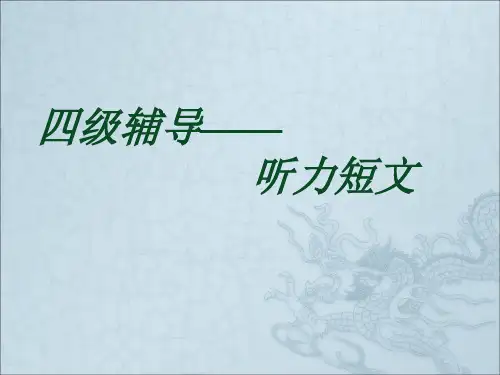
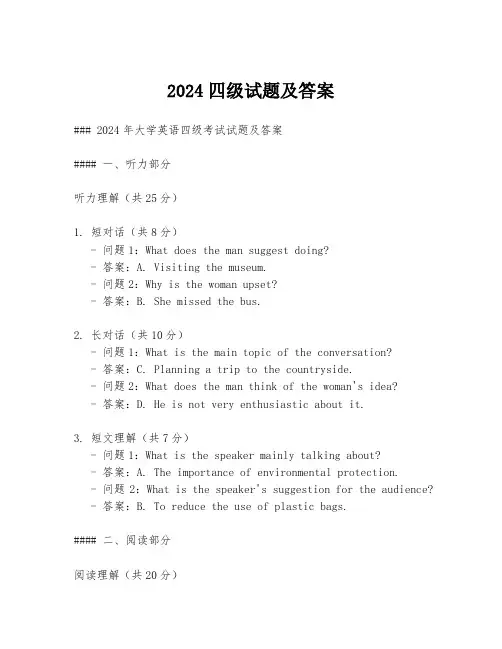
2024四级试题及答案### 2024年大学英语四级考试试题及答案#### 一、听力部分听力理解(共25分)1. 短对话(共8分)- 问题1:What does the man suggest doing?- 答案:A. Visiting the museum.- 问题2:Why is the woman upset?- 答案:B. She missed the bus.2. 长对话(共10分)- 问题1:What is the main topic of the conversation?- 答案:C. Planning a trip to the countryside.- 问题2:What does the man think of the woman's idea?- 答案:D. He is not very enthusiastic about it.3. 短文理解(共7分)- 问题1:What is the speaker mainly talking about?- 答案:A. The importance of environmental protection.- 问题2:What is the speaker's suggestion for the audience? - 答案:B. To reduce the use of plastic bags.#### 二、阅读部分阅读理解(共20分)1. 快速阅读(共10分)- 问题1:What is the main idea of the passage?- 答案:A. The benefits of regular exercise.- 问题2:What does the author suggest to improve health? - 答案:B. Combining exercise with a healthy diet.2. 仔细阅读(共10分)- 问题1:According to the passage, what is the key to success?- 答案:C. Persistence and hard work.- 问题2:What does the author believe about failure?- 答案:D. It is a stepping stone to success.#### 三、写作部分作文(共15分)题目:The Impact of Technology on Education范文:In recent years, the integration of technology in education has been a topic of much debate. It is undeniable that technology has revolutionized the way we learn and teach. For instance, the use of online platforms and digital resources has made education more accessible and interactive. Students can now access a wealth of information at their fingertips, and teachers can employ various tools to enhance the learning experience.However, there are also concerns about the over-reliance ontechnology. Some argue that it may lead to a decrease in critical thinking skills as students may become too dependent on search engines and online summaries. Additionally, the digital divide can exacerbate educational inequalities, as not all students have equal access to technology.In conclusion, while technology has undoubtedly brought about positive changes in education, it is crucial to strike a balance. Educators should use technology as a tool to complement traditional teaching methods, ensuring that students develop a well-rounded set of skills.#### 四、翻译部分汉译英(共20分)原文:随着经济的快速发展,人们的生活水平有了显著提高。

大学英语四级考试题型分析英语四级,是所有大学生都必须面对的全国大型英语考试,甚至成了毕业后找工作的敲门砖,而且学习英语的主要目的是阅读和口语。
以下是我为大家整理的大学英语四级考试题型分析,感谢您的欣赏。
英语四级考试各题型解题技巧一、听力攻略短文听力五大常考主题1、社会生活类题型出现的次数最多,内容涉及社会新闻、环境保护、生活方式、劳动就业等方面。
有时会以新闻播报的方式出现,兼考查天气情况。
2、人物故事类包括生活经历、奇人怪事、励志故事、名人轶事等。
考生要注意这类题的第一句和最后一句。
3、科学技术类题材主要考查细节题、主旨题,考生做题时应记下高频词。
4、文化教育类题型包括校园生活、语言文化、民俗习惯、娱乐旅行等。
考查细节题居多,有时也会问原因,故听音时要多加注意表示举例、转折、因果的逻辑关系。
5、医疗保健类重点在具体的医疗研究上,听音时考生要注意首尾、转折、因果等处。
复合式听写:关键词“预测〞技巧技巧一:根据空白处的语法形式预测答案在复合式听写中,填单词采用的是完形填空的形式,每个空格都处于特定的上下文之中。
因此,考生可以根据空格在句中的位置判断所填单词的词性。
由历年真题来看,六级听写的单词局部名词和动词占所需填写单词中的5-6个,副词和形容词一般在1-3个,短语占到2-3个。
技巧二:根据并列连词或并列关系预测答案在预读听写短文时,考生常常会看到but,and,as well as这类并列连词。
这些标志性的连词可以暗示所填词的词性及意思。
技巧三:根据固定搭配预测答案英语的表达中有许多固定搭配,出题人有时会在固定搭配的短语上挖空,考生平时要多积累常用的固定表达,以不变应万变。
二、阅读攻略长篇阅读做题技巧:1. 快速阅读文章标题、首尾两段,了解主题;2. 通读10道题目,划出关键词;3. 带着关键词浏览文章,寻找与所划关键词一致或同义的词句。
阅读常考题型详解1、细节题例:55. What is the chief concern of native high-skilled,better-educated employees about the inflow of immigrants(CET-6, 2021.6)原文出处:Among high-skilled,better-educated employees, however, opposition was strongest in states with both high numbers of immigrants and relatively generous social services.题干中的high-skilled,better-educated employees的信息非常具体,和原文一致。
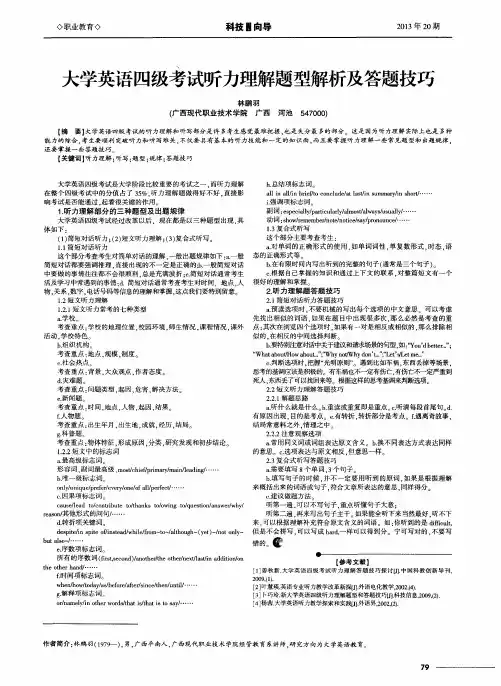
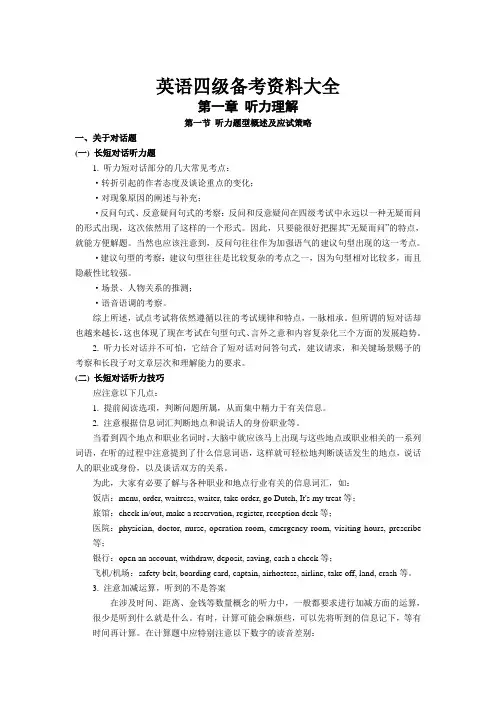
英语四级备考资料大全第一章听力理解第一节听力题型概述及应试策略一、关于对话题(一) 长短对话听力题1. 听力短对话部分的几大常见考点:·转折引起的作者态度及谈论重点的变化;·对现象原因的阐述与补充;·反问句式、反意疑问句式的考察:反问和反意疑问在四级考试中永远以一种无疑而问的形式出现,这次依然用了这样的一个形式。
因此,只要能很好把握其―无疑而问‖的特点,就能方便解题。
当然也应该注意到,反问句往往作为加强语气的建议句型出现的这一考点。
·建议句型的考察:建议句型往往是比较复杂的考点之一,因为句型相对比较多,而且隐蔽性比较强。
·场景、人物关系的推测;·语音语调的考察。
综上所述,试点考试将依然遵循以往的考试规律和特点,一脉相承。
但所谓的短对话却也越来越长,这也体现了现在考试在句型句式、言外之意和内容复杂化三个方面的发展趋势。
2. 听力长对话并不可怕,它结合了短对话对问答句式,建议请求,和关键场景赐予的考察和长段子对文章层次和理解能力的要求。
(二) 长短对话听力技巧应注意以下几点:1. 提前阅读选项,判断问题所属,从而集中精力于有关信息。
2. 注意根据信息词汇判断地点和说话人的身份职业等。
当看到四个地点和职业名词时,大脑中就应该马上出现与这些地点或职业相关的一系列词语,在听的过程中注意提到了什么信息词语,这样就可轻松地判断谈话发生的地点,说话人的职业或身份,以及谈话双方的关系。
为此,大家有必要了解与各种职业和地点行业有关的信息词汇,如:饭店:menu, order, waitress, waiter, take order, go Dutch, It's my treat等;旅馆:check in/out, make a reservation, register, reception desk等;医院:physician, doctor, nurse, operation-room, emergency room, visiting hours, prescribe 等;银行:open an account, withdraw, deposit, saving, cash a check等;飞机/机场:safety-belt, boarding card, captain, airhostess, airline, take off, land, crash等。
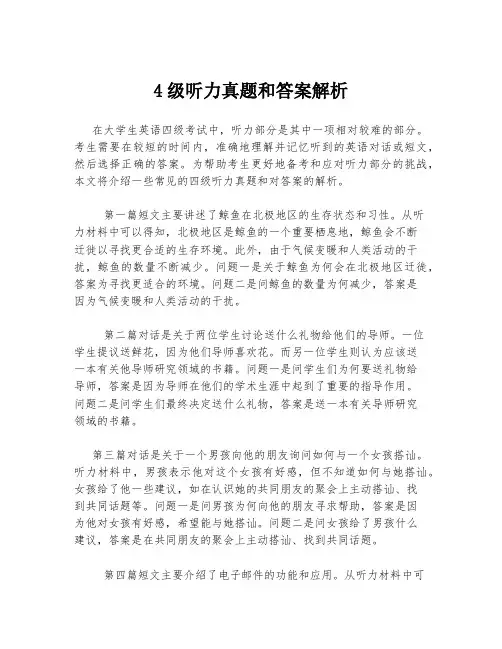
4级听力真题和答案解析在大学生英语四级考试中,听力部分是其中一项相对较难的部分。
考生需要在较短的时间内,准确地理解并记忆听到的英语对话或短文,然后选择正确的答案。
为帮助考生更好地备考和应对听力部分的挑战,本文将介绍一些常见的四级听力真题和对答案的解析。
第一篇短文主要讲述了鲸鱼在北极地区的生存状态和习性。
从听力材料中可以得知,北极地区是鲸鱼的一个重要栖息地,鲸鱼会不断迁徙以寻找更合适的生存环境。
此外,由于气候变暖和人类活动的干扰,鲸鱼的数量不断减少。
问题一是关于鲸鱼为何会在北极地区迁徙,答案为寻找更适合的环境。
问题二是问鲸鱼的数量为何减少,答案是因为气候变暖和人类活动的干扰。
第二篇对话是关于两位学生讨论送什么礼物给他们的导师。
一位学生提议送鲜花,因为他们导师喜欢花。
而另一位学生则认为应该送一本有关他导师研究领域的书籍。
问题一是问学生们为何要送礼物给导师,答案是因为导师在他们的学术生涯中起到了重要的指导作用。
问题二是问学生们最终决定送什么礼物,答案是送一本有关导师研究领域的书籍。
第三篇对话是关于一个男孩向他的朋友询问如何与一个女孩搭讪。
听力材料中,男孩表示他对这个女孩有好感,但不知道如何与她搭讪。
女孩给了他一些建议,如在认识她的共同朋友的聚会上主动搭讪、找到共同话题等。
问题一是问男孩为何向他的朋友寻求帮助,答案是因为他对女孩有好感,希望能与她搭讪。
问题二是问女孩给了男孩什么建议,答案是在共同朋友的聚会上主动搭讪、找到共同话题。
第四篇短文主要介绍了电子邮件的功能和应用。
从听力材料中可以得知,电子邮件是一种快速、廉价的沟通方式,可以用于发送照片、文件等。
此外,电子邮件还可以设置自动回复和组织会议等功能。
问题一是问电子邮件的主要功能是什么,答案是沟通方式的快速和廉价。
问题二是电子邮件还具备哪些功能,答案是发送照片、文件,以及设置自动回复和组织会议等。
以上是四级听力的一些常见题型和答案解析。
在备考过程中,考生可以通过大量的听力练习,提高自己对听力材料的理解能力和判断能力。
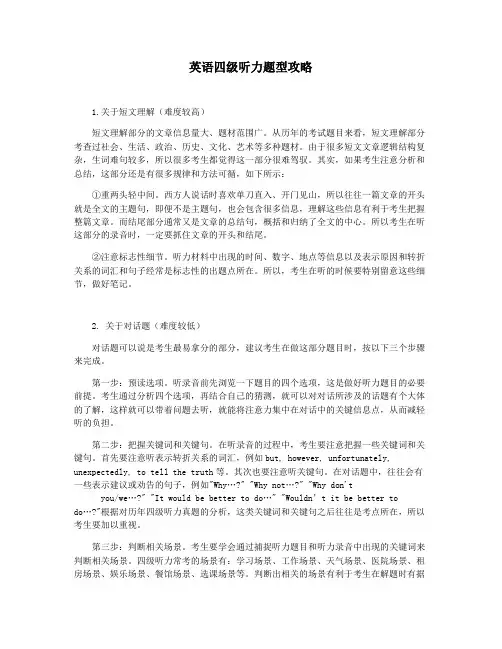
英语四级听力题型攻略1.关于短文理解(难度较高)短文理解部分的文章信息量大、题材范围广。
从历年的考试题目来看,短文理解部分考查过社会、生活、政治、历史、文化、艺术等多种题材。
由于很多短文文章逻辑结构复杂,生词难句较多,所以很多考生都觉得这一部分很难驾驭。
其实,如果考生注意分析和总结,这部分还是有很多规律和方法可循,如下所示:①重两头轻中间。
西方人说话时喜欢单刀直入、开门见山,所以往往一篇文章的开头就是全文的主题句,即便不是主题句,也会包含很多信息,理解这些信息有利于考生把握整篇文章。
而结尾部分通常又是文章的总结句,概括和归纳了全文的中心。
所以考生在听这部分的录音时,一定要抓住文章的开头和结尾。
②注意标志性细节。
听力材料中出现的时间、数字、地点等信息以及表示原因和转折关系的词汇和句子经常是标志性的出题点所在。
所以,考生在听的时候要特别留意这些细节,做好笔记。
2. 关于对话题(难度较低)对话题可以说是考生最易拿分的部分,建议考生在做这部分题目时,按以下三个步骤来完成。
第一步:预读选项。
听录音前先浏览一下题目的四个选项,这是做好听力题目的必要前提。
考生通过分析四个选项,再结合自己的猜测,就可以对对话所涉及的话题有个大体的了解,这样就可以带着问题去听,就能将注意力集中在对话中的关键信息点,从而减轻听的负担。
第二步:把握关键词和关键句。
在听录音的过程中,考生要注意把握一些关键词和关键句。
首先要注意听表示转折关系的词汇,例如but, however, unfortunately, unexpectedly, to tell the truth等。
其次也要注意听关键句。
在对话题中,往往会有一些表示建议或劝告的句子,例如"Why…?" "Why not…?" "Why don'tyou/we…?" "It would be better to do…" "Wouldn’t it be better to do…?"根据对历年四级听力真题的分析,这类关键词和关键句之后往往是考点所在,所以考生要加以重视。
四级听力常考话题听力考试是大学英语四级考试中的重要一部分,四级听力常考话题是备战听力考试时需要重点关注的内容。
本文将为大家总结四级听力常考的话题,并提供一些备考建议。
一、教育类话题教育类话题是四级听力中经常出现的一类题目。
这类题目通常涉及到校园生活、学习方法、学生社团等内容。
对于这类题目,考生需要熟悉一些常用的教育词汇和表达方式。
此外,多听一些与教育相关的英语广播或者新闻也会有助于提升听力能力。
二、社交类话题社交类话题主要涉及到日常生活中的交流活动,如聚会、约会、参加社团活动等。
考生在备考过程中,可以多关注一些英语社交礼仪方面的知识,以及一些与社交活动相关的习惯用语和表达方式。
三、健康与生活方式类话题健康与生活方式类话题是四级听力中的常考内容,涉及到饮食、锻炼、休息等方面。
考生可以通过阅读一些健康类文章和听力材料来扩充相关词汇和表达方式。
四、科技与媒体类话题科技与媒体类话题主要关注科技发展和媒体应用等内容。
考生可以通过多关注一些科技新闻和科技类节目来扩展相关词汇和理解能力。
五、社会问题类话题社会问题类话题通常涉及到一些社会热点问题,如环境污染、就业问题、教育资源分配等。
考生需要通过阅读相关的社会问题分析类文章,来了解相关词汇和表达方式。
六、旅游与文化类话题旅游与文化类话题是四级听力中较为常见的一类话题。
这类题目通常涉及到旅游景点介绍、文化活动和相关的传统习俗等。
考生可以通过了解一些著名景点和特色文化,来提前对这类话题做好准备。
总之,备考四级听力考试时,考生需要根据常考话题的特点,有针对性地进行复习。
除了扩充相关词汇和表达方式之外,多听一些与话题相关的英语材料,提高听力理解能力也是十分重要的。
希望以上内容对大家备考四级听力有所帮助。
2023年六月第一套英语四级听力解析一、引言2023年六月的英语四级考试已经结束,听力部分一直是考生们比较关注的部分之一。
在新的英语四级听力部分中,考生需要通过听力材料来获取信息,理解对话和讲话者的意图,并根据所听到的内容进行问题回答。
本文将对2023年六月第一套英语四级听力进行解析,帮助考生更好地理解听力材料,并在复习备考时有针对性地提高听力水平。
二、听力解析1. Part A: ConversationsConversation 1A: Are you going to the bookstore later?B: Yeah, I need to pick up the book for my history class.A: Do you mind picking up one for me too?B: Sure, what book do you need?A: It's called "World History: From Ancient Times to the Present". B: Got it. I'll pick one up for you.对话解析:这段对话是两个同学之间的对话,他们讨论去书店买书的事情。
其中A需要买一本世界历史相关的书籍,而B答应了并且询问了A需要的具体书籍名称。
考生需要通过这段对话来理解对话中人物的目的以及需要采取的行动。
Conversation 2A: Hey, do you want to go see the new movie this weekend? B: I wish I could, but I have to work on my project for class.A: Come on, everyone else is going.B: I really can't. It's due on Monday and I hardly got anything done yet.A: Okay, maybe next time.对话解析:这段对话是两个朋友之间的对话,他们讨论是否一起去看新电影。
英语四六级考试必备资料四级考试听力短文题10大解题原则.1.听即原则:所听即所得,听到什么就选什么(正好与短对话相反,短对话时听到的一般不选)2.重读原则:某单词被反复读到或是在语音上加以重读,因引起重视如果选项中出现很可能是正确答案3.顺序原则:出题顺序一般与行文顺序相同除了主题题和部分说明文4.主题原则:主题一般出现在段落的头尾部分,所以要集中精力听清前三句话和最后两句话5.原因原则:凡出现表示原因,目的的很有可能是考点如:because so as 等词前后要着重听6.转则原则:凡出现表示转则的词如:but however yet 等,后面的句子往往是考点,要引起重视7.光明原则:事情一般都是向着好的方面发展的,主人公多数是大难不死的,事情总是逢凶化吉,绝处逢生的8.男女原则:同短对话9.穷学生原则:学生一般都是比较穷的,不能继续学业一般都是因为经济原因,因为穷一般还比较喜欢DIY一些东西10.偏怪小原则:一般故事总是稀奇古怪的,经过总是曲折离奇的,结局总是出人意料的。
宗旨就是意料之外、情理之考试听力短文题10大类标志词:2.唯一级标志词only / unique / prefer / every / one / of all / perfect / ……3.因果项标志词cause / lead to / contribute to / thanks to / owing to / question / answer / why / reason / 其他形式的问句/ ……4.转则项关键词despite / in spite of / instead / while / from ~ to ~ / although ~ (yet)~ / not only ~ but also ~ / ……5.序数项标志词所有的序数词(first , second)/ another / the other / next / last / in addition / on the other hand / ……6.时间项标志词when / how / today / as / before / after / since / then / unti l / ……7.解释项标志词or / namely / in other words / that is / that is to say / ……8.目的项标志词to / for / ……9.总结项标志词all in all / in brief / to conclude / at last / in summary / in short / ……10.强调项标志词副词:especially / particularly / almost / al ways / usually / …… 动词:show / remember / note / notice / say / pronounce / ……根据四级考试大纲,完型填空满分占710分的10%。
四级听力短文理解第10堂如何把握短文主旨学会如何快速而准确地把握文章主旨,理清文章结构,攻克主旨题。
主旨题主要考查考生对短文的主旨大意或短文写作目的的理解和把握。
常见的提问方式有:What is the topic of the passage?What is the speaker’s purpose in giving this talk?What is the passage mainly about? 对一篇短文主旨的理解,不仅是解答主旨题的关键,而且有助于考生把握整篇文章的结构并理解文中重要的事实细节。
其实,只要掌握了正确的方法,快速准确地抓住短文的主旨其实并不是什么难事,不信你试试!一、要学会利用选项推测短文主题听力理解的每道题都是围绕听力材料的主要内容而设,故根据各选项中反复出现的相同或相关的词语,往往可大致推测出其所要陈述的主题。
关于这一点,我们在前一天中已经讲到过,记住,这一招很管用哦!二、重点关注首尾句短文的开头往往就是文章的主题句,对整个对话或短文内容起一个概括和提示的作用,有时,只需抓住开头的一、两句话,即可明确短文的主旨。
另外,结尾处也往往含有总结性的语言,一般也会对主题起到响应和重申的作用,故也应加以留意。
三、留意重复频率较高的词或短语对话的中心内容理所当然会得到说话人的强调,而一个非常重要、也是非常明显的强调方式就是重复。
因此,将短文中多次出现的同类词语或内容进行归纳总结,往往就可以知道该篇短文主要在讲什么。
四、优先选择概括性较强的选项主旨题的答案必然具有较强的概括性,而出题人经常会用一些文中涉及到的、与主题相关的某一方面内容来作为干扰项,即以偏概全,引诱考生犯错。
因此,当你在某两个选项之间犹豫不决时,记住,要优先选择概括性强的那个选项。
【例】(06-6-Passage One)【预览选项】11.[A]It has done more harm than good in the southern USA.[B]It was brought to the northern USA by Asian farmers.[C]It was introduced into the USA to kill harmful weeds.[D]It can be used by farmers to protect large buildings.12.[A]They will become too hard to plough.[B]They will soon be overgrown with Kudzu.[C]People will have to rely on Kudzu for a living.[D]People will find it hard to protect the soil.13.[A]The soil there is not so suitable for the plant.[B]The factories there have found a good use for it.[C]The farmers there have brought it under control.[D]The climate there is unfavorable to its growth.【预测信息】预览三道题各选项,由farmers, soil, plant, growth等词以及12题中的Kudzu一词,可推知本文很可能是对一种名为“Kudzu”的植物的介绍。
大学英语四级经典听力范文200字全文共10篇示例,供读者参考篇1Hello everyone! Today I'm going to talk about a classic listening passage from the College English Test Band 4, also known as CET-4. It’s about a boy named Jack who loves playing the guitar.In the passage, Jack talks about his passion for music and how he started playing the guitar. He explains that he first became interested in music when he was just a little kid and saw his uncle playing the guitar at a family gathering. From that moment on, he knew he wanted to learn how to play too.As Jack got older, he saved up his pocket money to buy his very first guitar. He practiced every day, watching tutorials online and playing along to his favorite songs. He talks about the challenges he faced, like sore fingers and frustrating mistakes, but he never gave up.Eventually, Jack’s hard work paid off and he became a talented guitarist. He started performing at school events and even joined a band with his friends. He describes the feeling ofplaying live music in front of an audience as exhilarating and fulfilling.Through his story, Jack encourages others to pursue their passions and never stop practicing. He believes that with dedication and determination, anyone can achieve their dreams.I find Jack's story inspiring and it motivates me to work harder towards my own goals. I hope it inspires you too! Thank you for listening.篇2Hey guys, today I'm gonna talk about the classic listening material for the College English Test Band 4, also known as CET-4. It's super important to practice your listening skills for this test because it can be pretty tricky!One of the classic listening passages for CET-4 is a conversation between two students discussing their plans for the upcoming weekend. They talk about going to the movies, having a picnic in the park, and maybe even doing some shopping. It's a casual conversation but there are lots of details you need to pay attention to in order to answer the questions correctly.Another classic listening passage is a lecture about climate change. The professor talks about the causes of climate change, the effects on the environment, and what we can do to help stop it. It's really important to understand this passage because climate change is a big issue facing our planet today.There are also listening passages about history, science, and literature, so make sure you're prepared for anything! Practice listening to English as much as you can, whether it's watching English TV shows, listening to English music, or even just chatting with your English-speaking friends.Remember, the key to doing well on the CET-4 listening section is to stay focused and practice, practice, practice! Good luck, everyone!篇3Hey guys!Today I'm gonna tell you about the famous English listening test, the College English Test Band 4, also known as CET-4. It's like a super important test for university students in China!So, basically, CET-4 is a test to see if you can understand English spoken in different accents and dialects. It's a listeningtest that has different sections, like short conversations, long conversations, and lectures. You have to listen carefully and answer questions about what you hear.But don't worry, you can totally prepare for this test! You can practice listening to English music, watching English movies, and even chatting with your foreign friends. And of course, you can do practice tests to get better at understanding English.When you take the test, just remember to stay calm and focused. Listen carefully to the speakers, and try to understand the main ideas. Don't worry if you miss a word or two, just keep on listening and do your best to answer the questions.After the test, you'll get your score and know how well you did. If you pass, that's awesome! If not, don't worry, you can always try again and improve your listening skills.So, guys, remember to practice, stay focused, and do your best on the CET-4 test. Good luck!篇4Once upon a time, there was a big test called College English Test Four. It was super hard and everyone was really nervousabout it. But don't worry, I'm here to tell you all about it so you can be prepared!So, the test has four parts: listening, reading, writing, and speaking. The listening part is when you have to listen to some conversations or lectures and answer questions about them. Sometimes they talk really fast, so you have to listen carefully!The reading part is when you read some passages and answer questions about them. Make sure you understand what you're reading, or you might get confused!The writing part is when you have to write essays or letters about different topics. Remember to use good grammar and vocabulary!And finally, the speaking part is when you have to talk about a topic in front of the examiner. Don't be shy, just speak clearly and confidently!To prepare for the test, you can practice listening to English songs or watching English movies. You can also read English books and practice writing essays. And don't forget to practice speaking with your friends or family!Just remember, the more you practice, the better you'll do on the test. So don't be afraid, just believe in yourself and you'll do great! Good luck!篇5Hello everyone! Today I'm going to talk about a classic example of the English listening section in the College English Test Band 4.The listening test in CET-4 is super important because it's worth a lot of points. It's where you have to listen to a conversation or a lecture and answer questions about it. Sometimes the speakers talk really fast, so you have to listen carefully and quickly write down the answers.One time, in the listening test, there was a conversation between two students talking about their plans for the weekend. The boy wanted to go hiking, but the girl wanted to stay home and watch movies. They ended up compromising and decided to go biking in the park instead.Another time, there was a lecture about the history of English literature. The professor talked about famous writers like Shakespeare and Jane Austen. He also mentioned important literary movements like Romanticism and Modernism. It wasreally interesting to learn about how English literature has evolved over the years.Listening practice is really important for passing the CET-4 exam. You can listen to English songs, watch English movies, or even find practice tests online. The more you listen, the better you'll get at understanding spoken English.So remember, practice makes perfect! Keep listening and don't give up. Good luck on your CET-4 exam! You can do it!篇6Hi everyone! Today I'm going to tell you about a classic listening passage from the College English Test Band 4 (CET-4). In this passage, a professor is talking to his students about the history of the Great Wall of China.So, like, back in ancient China, there were all these different states, right? And they were always fighting with each other. So this emperor dude named Qin Shi Huang was like, "Hmm, maybe I should build a wall to keep out all these enemies." And that's how the Great Wall was born!The Great Wall is like super long, over 13,000 miles long. Can you believe it? And it's not just one big wall; there are actually abunch of walls that were built over different dynasties. It's like a giant puzzle!Now, the professor in the passage explains that the Great Wall was not just for defense, but also for trade and communication. It helped to connect different parts of China and allowed people to travel safely.But here's the crazy part - the Great Wall was actually not very effective in keeping out invaders. Some enemies were able to breach the wall and conquer parts of China. But hey, at least the wall looks cool, right?Overall, the passage is super interesting and teaches us a lot about the history of China. Plus, it's a great way to practice your listening skills for the CET-4 exam. So next time you hear about the Great Wall, you'll know all about it!篇7Hey guys, today I want to talk about a super important thing – the English listening test in the college English four-level exam. It's a big deal, so let's get ready for it!So, in the listening test, you will listen to recordings of conversations, lectures, and other stuff in English. It can be kindof tricky because you have to listen carefully and understand what they are saying. But don't worry, I've got some tips to help you do your best.First of all, practice, practice, practice! The more you listen to English, the better you will get at understanding it. You can listen to English songs, watch English movies, or even try listening to English podcasts. The more you listen, the easier the test will be.Next, try to pay attention to the main idea of what they are saying. Don't get too caught up in the details, just focus on the big picture. If you miss a word or two, it's okay – just keep listening and try to understand the overall meaning.Also, don't be afraid to guess if you don't know the answer. Sometimes you can figure out the answer by using your common sense and thinking about the context of the conversation. Just take a guess and move on if you're not sure.And finally, don't get stressed out if you don't understand everything. The test is meant to challenge you, so it's okay if you don't get every question right. Just do your best and remember that practice makes perfect!So, that's it for my tips on the English listening test. Remember to practice, pay attention, guess if you have to, and stay calm. You've got this – good luck!篇8Title: My Experience with the Classic Listening Material of CET-4Hi everyone, I'm a fourth grader and I want to share my experience with the classic listening material of CET-4. So, gather around and listen to my story.At first, when I heard about CET-4, I was like, "What's that? Is it some kind of cool game or something?" But then I found out it's actually an English test for college students. I was like, "Whoa, that sounds so hard!"But then I heard that one of the parts of the test is listening, and I thought, "Hey, I'm great at listening! I always listen to my teacher in class, so maybe I can do well on this part."So, I decided to listen to some practice materials for CET-4. At first, it was really tough. I couldn't understand some of the words and phrases. But I didn't give up. I kept listening and practicing every day.And guess what? I started to improve! I could understand more and more of what they were saying in the listening materials. I learned new words and phrases, and I felt more confident in my English skills.Finally, when I listened to the classic listening material of CET-4, I was so excited. I could understand almost everything! I felt like a real English master. And when I heard that I got a high score on the listening part of the test, I was over the moon!Now, I'm proud to say that I've conquered the classic listening material of CET-4. It was a challenge, but I faced it head-on and came out victorious. And you know what? You can do it too! Just listen, practice, and never give up.So, that's my story. I hope you enjoyed it and maybe even learned something from it. Remember, with hard work and determination, you can achieve anything you set your mind to. Good luck, and keep on listening!篇9Hey guys, do you know what is super important for us to learn in college? It's English! And not just any English, it's the English we need to know to pass the college English Test Band 4(CET-4)! I'm gonna share with you a classic listening passage from the CET-4 test, so pay attention!The passage is about climate change, which is a big issue in the world right now. The speaker talks about how the Earth's climate is getting warmer because of things like carbon dioxide in the atmosphere. This can cause all kinds of problems like melting ice caps, rising sea levels, and extreme weather. It's up to all of us to do our part to help the environment and stop climate change.The speaker also mentions some ways we can reduce our carbon footprint, like using public transportation, recycling, and saving energy at home. It's really important for all of us to be aware of the impact we have on the environment and make changes to protect our planet for future generations.So remember, guys, learning English isn't just about passing a test – it's about understanding the world around us and being able to communicate with people from different cultures. Keep studying hard and you'll be able to conquer the CET-4 in no time! Good luck, everyone!篇10Hey guys, do you know what the English four levels are? Well, let me tell you all about it! The English four levels are called the "College English Test" or CET-4 for short. It's a super important test that college students in China have to take to show their English skills.When you're preparing for the listening part of CET-4, you gotta practice a lot! The listening part is super tricky because you gotta listen to the recording and answer questions at the same time. It's like trying to walk and chew gum at the same time - not easy!But don't worry, there are lots of tips and tricks to help you ace the listening part. First off, make sure you listen carefully and pay attention to the key words. The questions are usually based on the main ideas or specific details in the recordings, so you gotta stay focused.Another tip is to practice, practice, practice! Listen to English podcasts, watch movies or TV shows in English, and try to listen to different accents to improve your listening skills. The more you practice, the better you'll get!And remember, don't be afraid to ask for help if you don't understand something. Your teachers, classmates, or even onlineresources can help you out. Just keep practicing and you'll be a listening pro in no time!So there you have it, a little sneak peek into the world of CET-4 listening. Keep practicing and you'll crush that test! Good luck, everyone!。
能级
一、教学目标
1.了解原子的玻尔模型
2.了解原子能级概念和氢原子的能级图.
3.了解玻尔理论的重要意义及其局限性.
二、重点、难点分析
1.原子的玻尔模型是本节课的重点内容。
2.对原子发光现象的解释是学习的难点。
三、主要教学过程
(一)新课引入
前一节提到卢瑟福的原子核式结构学说跟经典的电磁理论产生了矛盾,这说明了经典的电磁理论不适用于原子结构.那么怎么解释原子是稳定的?又怎么解释原子发光的光谱不是连续光谱呢?
(二)教学过程设计
1.玻尔的原子模型.
(1)原子的稳定性.
经典的电磁理论认为电子绕原子核旋转,由于电子辐射能量,因此随着它的能量减少,电子运行的轨道半径也减小,最终要落入原子核中.
玻尔在1913年结合普朗克的量子理论针对这一问题提出新的观点.
玻尔假设一:原子只能处于一系列不连续的能量状态中,在这些状态中原子是稳定的,电子虽然绕核运动,但并不向外辐射能量.这些状态叫做定态.说明:这一说法和事实是符合得很好的,电子并没有被库仑力吸引到核上,就像行星绕着太阳运动一样.这里所说的定态是指原子可能的一种能量状态,有某一数值的能量,这些能量包含了电子的动能和电势能的总和.
(2)原子发光的光谱.
经典的电磁理论认为电子绕核运行的轨道不断的变化,它向外辐射电磁波的频率应该等于绕核旋转的频率.因此原子辐射一切频率的电磁波,大量原子的发光光谱应该是连续光谱.
玻尔针对这一问题提出新的观点.
玻尔假设二:原子从一种定态(E
初)跃迁到另一种定态(E
终
)时,它辐射(或
吸收)一定频率的光子,光子的能量由这两种定态的能量差决定,即
h=E初-E终.
说明:这一说法也和事实符合得很好,原子发光的光谱是由一些不连续的亮线组成的明线光谱.
(3)原子能量状态和电子轨道.
玻尔假设三:原子的不同能量状态跟电子沿不同的圆形轨道绕核运动相对应.原子的定态是不连续的,因此电子的可能轨道的分布也是不连续的.
2.氢原子的轨道半径和能量.(本部分内容中半径公式和能量公式实验教材不
讲)
玻尔从上述假设出发,利用库仑定律和量子论初步,计算出了氢的电子可能的轨道半径和对应的能量.
根据计算结果概括为公式:
说明公式中r 1、E 1和r n 、E n 的意义,并说明n 是正整数,叫做量子数,r 1=0.53×
10-10m ,E 1=-13.6eV . n=2,3,4…时,相应的能量为E 2=-3.4eV 、E 3=-1.51eV 、E 4=-0.85eV …E ∞=0.
3.氢原子的能级.
氢原子在各种定态时的能量值叫做能极,根据以上的计算,可画出示意的能级图.
原子最低能级所对应的状态叫做基态,比基态能量高的状态叫激发态.
原子从基态向激发态跃迁,电子克服库仑引力做功增大电势能,原子的能量增加要吸收能量.
原子也可以从激发态向基态跃迁,电子所受库仑力做正功减小电势能,原子的能量减少要辐射出能量,这一能量以光子的形式放出.
明确:原子的能量增加是因为电子增加的电势能大于电子减少的动能;反之原子的能量减少是因为电子减少的电势能大于电子增加的动能.
原子无论吸收能量还是辐射能量,这个能量不是任意的,而是等于原子发生跃迁的两个能级间的能量差.
明确:一个原子可以有许多不同的能量状态和相应的能级,但在某一时刻,一个原子不可能既处于这一状态也处于那一状态.如果有大量的原子,它们之中有的处于这一状态,有的处于那一状态.氢光谱的观测就说明了这一事实,它的光谱线不是一个氢原子发出的,而是不同的氢原子从不同的能级跃迁到另一些不同能级的结果.
[例]有大量的氢原子,吸收某种频率的光子后从基态跃迁到n=3的激发态,已知
氢原子处于基态时的能量为E 1,则吸收光子的频率 =_______,当这些处于激发态的氢原子向低能态跃迁发光时,可发出_________条谱线,辐射光子的能量为________.
分析:根据玻尔的第二条假设,当原子从基态跃迁到n=3的激发态
当原子从n=3的激发态向低能态跃迁时,由于是大量的原子,可能的跃迁有多种,如从n=3到n=1,从n=3到n=2,再从n=2到n=1,因此应该发出三条谱线,三条谱线光子的能量分别为
学说和量子理论结合,以原子的稳定性和原子的明线光谱作为实验基础而提出的.认识玻尔理论的关键是从“不连续”的观点即量子论观点理解电子的可能轨道和能量状态.玻尔理论对氢光谱的解释是成功的,但对其它原子光谱的解释就出现了较大的困难,显然玻尔理论有一定的局限性.出师表
两汉:诸葛亮
先帝创业未半而中道崩殂,今天下三分,益州疲弊,此诚危急存亡之秋也。
然侍卫之臣不懈于内,忠志之士忘身于外者,盖追先帝之殊遇,欲报之于陛下也。
诚宜开张圣听,以光先帝遗德,恢弘志士之气,不宜妄自菲薄,引喻失义,以塞忠谏之路也。
宫中府中,俱为一体;陟罚臧否,不宜异同。
若有作奸犯科及为忠善者,宜付有司论其刑赏,以昭陛下平明之理;不宜偏私,使内外异法也。
侍中、侍郎郭攸之、费祎、董允等,此皆良实,志虑忠纯,是以先帝简拔以遗陛下:愚以为宫中之事,事无大小,悉以咨之,然后施行,必能裨补阙漏,有所广益。
将军向宠,性行淑均,晓畅军事,试用于昔日,先帝称之曰“能”,是以众议举宠为督:愚以为营中之事,悉以咨之,必能使行阵和睦,优劣得所。
亲贤臣,远小人,此先汉所以兴隆也;亲小人,远贤臣,此后汉所以倾颓也。
先帝在时,每与臣论此事,未尝不叹息痛恨于桓、灵也。
侍中、尚书、长史、参军,此悉贞良死节之臣,愿陛下亲之、信之,则汉室之隆,可计日而待也。
臣本布衣,躬耕于南阳,苟全性命于乱世,不求闻达于诸侯。
先帝不以臣卑鄙,猥自枉屈,三顾臣于草庐之中,咨臣以当世之事,由是感激,遂许先帝以驱驰。
后值倾覆,受任于败军之际,奉命于危难之间,尔来二十有一年矣。
先帝知臣谨慎,故临崩寄臣以大事也。
受命以来,夙夜忧叹,恐托付不效,以伤先帝之明;故五月渡泸,深入不毛。
今南方已定,兵甲已足,当奖率三军,北定中原,庶竭驽钝,攘除奸
凶,兴复汉室,还于旧都。
此臣所以报先帝而忠陛下之职分也。
至于斟酌损益,进尽忠言,则攸之、祎、允之任也。
愿陛下托臣以讨贼兴复之效,不效,则治臣之罪,以告先帝之灵。
若无兴德之言,则责攸之、祎、允等之慢,以彰其咎;陛下亦宜自谋,以咨诹善道,察纳雅言,深追先帝遗诏。
臣不胜受恩感激。
今当远离,临表涕零,不知所言。